Note: John spoke to me for NFTE at the
start of February, when details for the canceled summer tour were still being
finalized.
MOT
MIKE TIANO: To start, Jon, let's
recap. When Yes finished touring in 2004 you decide to take a break.
What was behind your decision to take that break from Yes for a
while?
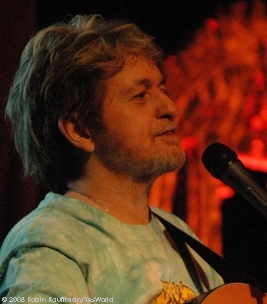 JON ANDERSON: I was very ill with bronchial pneumonia. I had
been touring for a year with that problem, and it just got worse and
worse. I needed to have at least six months off. Evidentially it
took three years to go away, but I just needed a break from touring. JON ANDERSON: I was very ill with bronchial pneumonia. I had
been touring for a year with that problem, and it just got worse and
worse. I needed to have at least six months off. Evidentially it
took three years to go away, but I just needed a break from touring.
MOT: You had been doing it pretty constantly since like 1998.
JA: Yeah, it wasn't very healthy for the band or for me; it wasn't a
good time. Jane's been amazing, keeping me healthy over the last
couple of years. I've come through stronger than ever now, and
that's why I'm willing to go on tour this year, and working out a
lot of things.
MOT: How do you address those fans that say "What's the deal? Just
get it together and get back on the road."
JA: Well, we had been on the road for three years with Rick, and we
hadn't made any new music, which really bummed me out. With a band,
you should be making music at least every year together, and we'd
never found time to create, as a band. I kept saying we should spend
time with Rick in the studio and do some recording. It wasn't that I
mentioned it a lot of times; it just wasn't collectively understood.
MOT: That being said, are you saying that for Yes' reemergence this
year in 2008 we'll be seeing some new music?
JA: Well I've been writing new music for the band, and I'm working
with Trevor on a couple of songs.
MOT: Trevor Rabin?
JA: Yes. I've always kept up a relationship with Trevor. I really
admire his work... I was going through a tough time, so I think it was
the middle of 2006; I realized I had to start doing my one man show,
which I had done earlier in 2005, and I realized I could stand up on
stage by myself like Steve does, like musicians do. You go out
there... Rick Wakeman going and doing your own show, and I just started
doing the same solo work and realized I can make a living without
all the exhaustion of doing Yes. It's a very exhausting experience
to take Yes on the road. People say "Oh Jon's just singing;" no, no,
no. I help to arrange the stage, lighting, what we do, why we do it;
I have a very important part and always have had a very strong part
of how and why Yes would tour, and about the music we should be
doing.
MOT: When you say "they", who are you referring to when you say they
think "I'm just a singer?"
JA: General opinion of people. When you look at a band, oh that's
the singer; that's what he does. Some people forget that some
singers do more than just stand up and sing. They really, like
myself, I've have a very strong energy within the band, both
musically and spiritually and artistically.
MOT: The only reason I ask that is because I think most savvy Yes
fans know that you're a musical architect.
JA: Yes fans, yeah. Yes fans certainly do, but the business side of
it tends to just overlook that.
MOT: You said the name of the tour is called "Close to the Edge and
Back", which is pretty tongue in cheek. Can you elaborate on that?
JA: Well, it was going to be called "Close to the End" tour, and
Jane spoke to me about it and said it sounds a little sad, and I
said ok. [Yes tour manager] Paul Silveira said yeah, it sounded a bit
sad. Why not "Close to the Edge and Back"? I said ok. So "Close to
the Edge and Back" it is.
MOT: Great. So, what else can Yes fans expect from Yes' reemergence
this year? We spoke about new music, but anything else we can get
excited about?
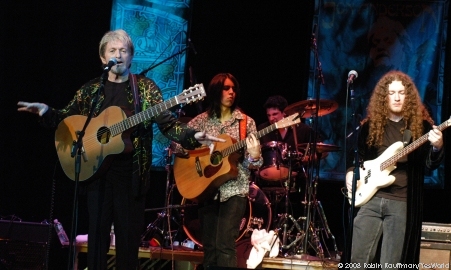
JA: I'm very excited about working with young people. Oliver Wakeman
will be playing in the band, because Rick can't tour anymore. His
doctors have told him that you can't do it. He can do small tours,
but he can't do the big work, you know. He's excited that his son's
playing.
MOT: How do you feel about Oliver stepping into dad's shoes?
JA: He's great; he plays just like Rick, and he's better looking
[both laugh].
MOT: Yes is going to try to be the babe-magnet this year, is that
what you're telling me? [laughs]
JA: Oh, he's for the babes, yeah. We're setting up a Yes scholarship
for young musicians. I work with Paul Green and his school, and we're setting up the
idea of inviting young musicians around--and old musicians--to send
in their DVDs and we'll pick out the best. Maybe they're going to
get up on stage with me and sing "Give Love Each Day" and another
song, so they're going to get a chance to be on stage with Yes. And
some of the Paul Green School of Rock All-Stars, they might actually
come on stage and open for the band and do some augmentation,
because they know the music and they play it so good, and just
augment the band on the big pieces, you know.
MOT: That's great, A part of your legacy is to help young musicians.
JA: Well, to save the music; VH-1 are very interested in co-creating
with me on this project, and we had a great discussion yesterday, so
it's in the process. It hasn't been finalized, but it's in the
process of being put together, and the idea is save the music. You
gotta get young people playing music, and there are so many young
people out of schools now, and it's not fair, and so many young kids
just love to get out to do that Guitar Hero and all that kind of
stuff. Video games, you know.
MOT: Guitar Hero and Rock Band...
JA: Rock Band, yeah; and the next step is for them to learn to play
guitar. Kids... first thing you buy, these kids these days seven years
old, get them a guitar, give them some drums, stick them in the
garage, and close the door.
MOT: Yeah, get them playing...
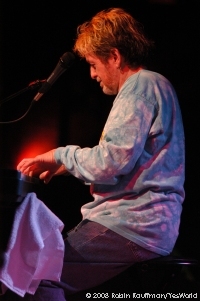 JA: Yeah, because rock 'n' roll is just... it's unbelievable that rock
n" roll is still going, and we're still in it, and we're still able
to make a living, and it's still developing. I find that I've never
been quite as experimental and adventurous musically as I've ever
been. JA: Yeah, because rock 'n' roll is just... it's unbelievable that rock
n" roll is still going, and we're still in it, and we're still able
to make a living, and it's still developing. I find that I've never
been quite as experimental and adventurous musically as I've ever
been.
MOT: I remember at one point many, many years
ago, when Yes were gaining popularity, you said that you wanted to
floor people with your music. Do you still feel that way?
JA: Oh gosh, yes. For sure, I think that music is an ever-opening
flower of energy, and there's great music to come, and I want to be
part of it, and I want to do very, very large and powerful pieces of
music, and it's a question of, like everything, timing, getting the
right people at the right time to understand what it is and get it
out into the world.
MOT: Right, a collaboration is really important. I'm in the process
of creating my own music, as a solo artist...
JA: Right.
MOT: ... and I'm telling my collaborator, I don't want this just to be
a song, just crank it out in ten minutes; I want it to be an event,
and I pointed to Yes' Masterworks--those songs Yes did back
then, to me, were events. That may sound pretentious, but
it's means something bigger...
JA: No, no, when you do something different, there's always people,
detractors, who say, "Oh, what is he trying to do?" and those kind
of people are just like, eating French fries and drinking beer, and
listening to pop songs. Ok, that's cool; there's nothing wrong with
that. But there are people that like smell the flowers and walk in
the mountains and feel the power of the Earth, and the power of the
Earth is in the music, and sometimes it can last a whole seven days.
There's no reason why music should be limited, you know; so I'd be
the first to say those people that are detractors from Yes music are
just stuck in their own ways, and that's ok. There's nothing wrong
with that. But I love adventure in music, and I love to experiment,
and I'm working on... I'm doing some podcasting next month, and I got
my podcasting system, and when Yes tours, we'll have a podcasting
system on tour. It'll be like reality-Yes, and we'll have our
"Confessional room".
MOT: When you mentioned the podcasting for Yes, I thought of
Concertsonics. Do you remember that? [Concertsonics, utilized on the
TALK tour, was basically broadcasting the soundboard mix to those at
the venue via a radio station. See "Future Times" at
NFTE #106
for more about that process.]
JA: Oh yeah, we were way ahead of the game, and the idea, it won't
make just Yes shows - everybody's seen them. It'll be like you're
actually backstage at Yes; you're hearing this, you're seeing that,
you're part of this, you're part of that , all live from behind the
scenes, and it's going to be very exciting. It'll be crazy, boring,
exciting like it can be. And we're setting up this project with my
friend in London, I think he's been in touch with you. And the
scrapbook online system where people can go and be part of the
scrapbook because I think people can go to that first day they ever
saw Yes and find that date and be on that page and send photographs
and say what happened; I was there, and I think that's going to be a
great thing for people to look at, read, see videos, see
photographs, and go through the same emotions. Because everywhere
I've been on tour, I seem to be seeing the same people, Yes fans you
know, and I'm a Yes fan, and they're just good people, and they just
like music and they just like living and they don't go crazy, but
they just love Yes music. And it has as a deeper meaning for
everyone like it has a spiritual connection, because we are all
spiritual people, and it touches us, and it touched me when I wrote
it, and then I think well I didn't write it; I was just the conduit
for it, and I was really good at it, and I'm still good at it, and I
want to be better at it, and I want to be able to bring more of that
love and light and music into the world, why not?
MOT: Right, and there's room for everybody. It's, unlike what
critics might make you think, it's not like it's this is "X" or
nothing. Music is a very personal experience.
JA: Hey, there's a million different kinds of flowers, and million
different kinds of birds and bees and million different kinds of
flowers and music, musical notes, thoughts--zillions! Why try to
control them?
MOT: When you perform as a solo artist, obviously you're the final
arbiter in terms of what gets on the record or goes out live.
Working with the members of Yes, you have some very, very strong
personalities there, and I was wondering do you find yourself
fighting for a musical idea you believe in?
JA: Not really. We've always had a very good brotherhood in the
musical sense. Now and again things happen, but that's just life,
but in general 80% of Yes' work has always been harmonic, connected.
We've always done it right. 20% was some in-fighting, but it wasn't
the most important thing. I think when I look at the collective
scope of music we did over 41 years, and it is the 41st anniversary
please, not the 40th. We're in the 41st year of Yes. Very important
for everybody to know that. I don't want to be a 40th anniversary
band. [Mock proclamation] I want to be a 41st anniversary band!
MOT: Do you think Yes will make it to a 50th anniversary band?
JA: I'll let you know when we get there.
MOT: [Laughs] That was a good answer.
JA: So when we go on tour, they [the other members of Yes] always
say "So what do you want to do?" and I just write out a rough
guesstimate of what I'd like to try, and they always come back and
say "Oh, that's great. Can we put in that? Can we change that?" And
I say yeah... but I like to know the pace of the show, how it's going
to develop, how it's going to grow. It might be at the end of the
first half will be "Close to the Edge" and the end of the second
half will be "Awaken". It's just got to be; it's just that moment in
time in our lives to do those songs just right.
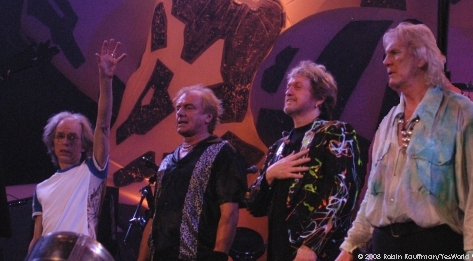
MOT: So those are two songs that are a must for you on this
upcoming tour.
JA: Yeah, I mean the set is very, very clear in my head. We'll start
with "Yours is No Disgrace", "Perpetual Change", "Heart of the
Sunrise"... other things like that. Definitely "And You and I", I would
want to do... and acoustic set which will be "Nine Voices",
"Revealing [Science of God]"...
MOT: "Revealing" in the acoustic set?
JA: An acoustic version of "Revealing" could be beautiful, just the
songs.
MOT: Yeah.
JA: Such a lovely song... piece, you know?
MOT: Yeah. "They Move Fast" has always been one of my favorite
parts.
JA: Jane loves it; she loves that song. We might do an acoustic
section of that ...
MOT: Have you thought about "The Remembering"? There's some nice
acoustic stuff on there as well.
JA: No, I never quite got around to it; I've been working on it this
last summer with a friend from New Jersey, and we're working on it.
It's a slow process; we're remembering songs and saying "Oh yeah,
that part." I just need to really spend time rethinking that. You
never know when that could pop up... "out in the city". It's a question
of a lot of things. "Turn of the Century", "South Side of the
Sky"... just going through what I've been writing down...
MOT: Any chance of something off the wall like "Future Times"?
JA: Not really because of people that are coming. We want to
hopefully we're going to try and bring in, obviously, the fans, plus
another third of people that don't even know Yes, and we want to
know that we know all what we're doing, and throw out a couple of
more obscure songs that we've never done on stage, and it's better
to do some that we know. It can't be more than a two-hour show.
It'll probably run a bit longer, but we want to keep it a really
well-oiled machine.
MOT: Talking about songs, one question that's always asked... one
question I'm always asked, why doesn't Jon doing songs from DRAMA?
Though, all people are going to speculate, can you set the record
straight here, please?
JA: I tried to get that, when we were on the last tour, "Tempus
Fugit", but I could never get them to go through it, but anyway,
it's not my album. I wasn't part of that album, so it's not
something I want to sing, but I did try, but you try and you say ok,
that's not going to happen, so we'll get on to the next one. Let's
do "Nine Voices", guys. "Oh, ok."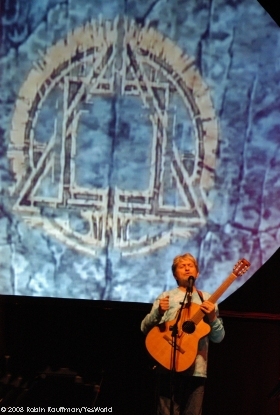
MOT: It's really a revelation listening to the extra bonus tracks on
TORMATO, because I didn't realize that "Does It Really Happen"
started as a tune with your involvement, and that ended up on DRAMA.
JA: Yeah, well that's what happens when music is very so like,
pollination, from one flower to the next, you try ideas out.
MOT: As far as ideas go, it sounds like you're just overflowing with
them. I don't think I ever told you this, but personally I think one
of your stunning achievements were the vocal arrangements of Steve's
"Sad-Eyed Lady of the Lowlands" [from PORTRAITS OF BOB DYLAN]. To
me, that was more of a Jon Anderson song than a Steve Howe song,
even though it's really a Bob Dylan song, but can you discuss your
approach to complex arrangements like that and your own feelings on
the results?
JA: I just did it more in the moment; I think that's the best way to
do anything is to do it in the moment. I knew that that song held a
big part of my life in 1966 when it first came out, and I was on
tour with my first band, but it's a song that I kept listening to a
hell of a lot; I just thought it was so amazing, and when Steve
mentioned he was doing a Bob Dylan album, I said "Cool! Can I sing
'Sad-Eyed Lady'?" He just sent me the backing track, and I sang it
in a more in the moment sort of thing. I really didn't know what I
was going to do and eventually came out the way it came out.
MOT: Just to be clear, are you saying you proposed that song to
Steve to play?
JA: Yeah. He said what would you like to do of Bob Dylan's, and I
said "Sad-Eyed Lady of the Lowlands".
MOT: Because I remember when Steve played it for me before it was
released, and I just went "Wow!" and Steve said, "Jon did a great
job on that song, didn't he?" and in terms of the harmonies, just
the vocal arrangements themselves, was just phenomenal.
JA: It's a long piece; it's hard in a way for people to want to
listen to a longer piece. Like I do with music, you have to... it has
to grow a bit, here, there, everywhere, so that helps, and the
lyrics are so sort of pastoral. They're very sort of... what can I say,
they're very good... anyway, Bob Dylan --my God!
MOT: Yeah, and it's a long song, but I think it's
still ended up shorter than the original Dylan piece, because it
took a whole album side [laughs].
JA: Yeah [laughs]. I know, I know.
MOT: So, you're doing this tour of Quebec, and one thing I find
really interesting about your solo tours is rather than pop from
major city to major city, you choose a region and you kind of
explore it, almost like a wandering musician exploring what life is
like within a particular area. I'm assuming this is all deliberate.
JA: Yeah... I've done that in Holland where you can go out and play
smaller towns, and you meet people who are just so excited that you
came to their town. They've travelled to the big city to see Yes,
and after the show you get meet and greet, but you can sense a
feeling of... they're just so, first very happy to see you, but more
than that they're very happy to hear the songs that they love, and I
just do them just more acoustically than ever. At the end of the
last tour I was just doing acoustic guitar show, acoustic piano, and
it felt really good; it just felt very, back in the minstrel
setting... you know telling stories and spreading the glory of the
world, the life that we live, how beautiful life is, and how
spiritual we truly are without being too, in any sense of form,
preaching at all, but saying, let's wake up. I wake up every day
wondering how better I can be at what I'm doing, you know, and I
think that's the message that these people enjoy and they need to
re-remember that that's why we live: to have a good time and be
connected to the vine, you know, and I think that's a good reason
for waking up.
MOT: Was it your idea to have so many shows in Quebec, because
that's a lot of shows for one particular region.
JA: Yeah, because me and Jane have always loved Quebec, and they
just came up with these offers and I said yeah I would love to do
it, no problem, and I just like doing ten shows in California, and
ten shows in Washington state, if it can be arranged, I'd rather do
that than to flit from city to city where people don't even know
you've come. I was on tour in Europe, and I went to one... it was
Moscow, and it was such a badly-organized happening, but there's
about 500 people there, but you could sense that nobody knew about
it, because it's so big. If it had been in a small town, the place
would have been full, because people would know about it and want to
come. I think that's one of the problems when Yes was touring that
you go to cities and there was no promotion, and I just said the
band cannot survive unless it's promoted. The band is great, but
you've got to let people know we're here. "Was Yes here?" "Oh my
God, I missed them!"
MOT: I've been involved with Yes for quite a long time, but it still
amazes me when I tell people I work with Yes, and they come up and
say "Yes? Are they still around?" [laughs] And I go, "What?!'
JA: Because I do a lot of solo touring, I do meet a lot of people.
I'm standing in an elevator and they'll say "Are you... did you use to
be... " you know. I said "Yeah, thank you very much, gotta go".
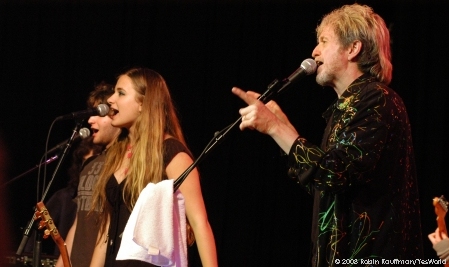
MOT: You were at NAMM...
JA: Yeah, I
was at NAMM, and I jammed with as many people as I could find, and
I'm making a movie. It was so funny; I was making the movie "NAMM -
the Musical". And I bumped into an old friend, Eric Idle, and I said "What are
you doing here? Eric, I'm doing 'NAMM - the Musical'," and he said
"Hey, NAMMalot."
MOT: [Laughs]
JA: We got that on film. The movie's going to be good.
MOT: How long have you known Eric Idle? I wasn't aware that you knew
any of Monty Python.
JA: Since the beginning of Monty Python, we used to eat at the same
fish and chips restaurant in London. I used to bump into them; we
became friends, and they did "Life of Brian", and...
MOT: Great movie.
JA: Yeah. They actually wrote it in Barbados, and I was living there
at that time, and Eric came by with his guitar and sat down. I was
sitting down outside the house there, it was beautiful there by the
beach, and he says "Hey, I've got a song," and he started singing
"'Always look on the bright side [of life]'--I just wrote this this
morning, Jon-'Life's piece of shit, when you think of it'." [sings].
I said "Perfect song." He explained they're going to do it hanging
from the cross and I said [loudly] "Perfect!"
MOT: [Laughs] Did you give him any pointers?
JA: No he's a good songwriter. Did you ever see the Rutles?
MOT: Oh yes, of course.
JA: One of the great movies; he's very good. He's a very good
friend, and he's helped me a lot in the years. He's given me some
great advice.
MOT: Speaking of the Rutles, I know the Beatles were a big influence
on you. I don't ever recall hearing which songs resonated with you
the most. Can you name any songs that really resonated with you, and
what it was about that song that did so?
JA: Well, I saw the Beatles before they became big time. I saw them
in Southport, just north of Liverpool, and there's nobody screaming.
Everybody was listening, and they were a great band. I went to the
Movie, "Hard Day's Night". The one song that really changed me was
"Eleanor Rigby". I was with my first band in Europe, and I heard it
on a small little radio at a petrol stop, and that really changed a
lot of my thinking. Revolver was a great album - "Sit back and let
you float downstream, and I'm crying.'" What's that one?
MOT: "Tomorrow Never Knows".
JA: "Tomorrow Never Knows" was like a breakthrough, and from then
on, obviously they got into other major work, so they were the gods.
[Mimicking John Lennon] I wanted to be a Beatle.
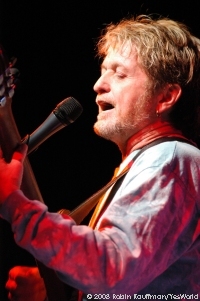 MOT: [Laughs] What are your thoughts on the tribute bands that have
sprung up to fill the Yes void? MOT: [Laughs] What are your thoughts on the tribute bands that have
sprung up to fill the Yes void?
JA: I think they're great. I work with a couple of guys from there.
I sent out a memo: "keyboard players wanted" last year or the year
before, and I'm working with a dozen people around the world
creating music, and one of them is the keyboard player from the band
in England. He's very good and very adventurous musically, so it's a
good thing to learn from different bands. When Yes first started, we
were doing the music of Jimmy Webb, the 5th Dimension. So we were
learning our chops from that and various other musical icons at that
time.
MOT: Yeah, I heard from Yes fans who said nobody should play Yes
music except Yes.
JA: [laughs]
MOT: And I think to myself, if that was my music and people out
there were playing my music, I'd be psyched [laughs].
JA: Well, you know you listen to other bands, you sense "Oh, that's
so Yes'. I was listening to some music the other day it just sounded
like early Yes... it was Radiohead. You hear parts of bits of a band and
say "Oh that's kind of early Yes, which was early Zappa, which was
early Beatles." It all revolves.
MOT: In closing, what is the one biggest thing you want Yes to
achieve this year?
JA: Well I think it's to tour. This tour is to reaffirm the wonders
of making music, the reaffirm of the brotherhood of Yes, and there
isn't music that has been created that is its own style of music;
you can call it Yes music, and that down the line a lot of other
musicians will learn from the work we did, and a lot of people will
be very happy and thankful that we stuck with the band. I know that
there are thousands and thousands of fans around the world who feel
like the part of the Yes family, and I say I'm part of that as well,
and I stand on-stage and I say, "I am Yes fan" and they all cheer,
because I see you in everywhere I go, I see the same people. I see
the same energy, and it's one of love and devotion to something and
acceptance of how music has changed your life, and I've been part of
that change, because Yes music changed my life.
MOT: Yes music is changing our lives as well, and it's great to know
that Yes will continue to be changing our lives.
JA: Sure.
MOT: Jon, thanks for speaking with me today. And tell
Jane thanks for keeping you healthy.
JA: I wish you well.
|
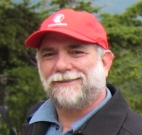


 JON ANDERSON: I was very ill with bronchial pneumonia. I had
been touring for a year with that problem, and it just got worse and
worse. I needed to have at least six months off. Evidentially it
took three years to go away, but I just needed a break from touring.
JON ANDERSON: I was very ill with bronchial pneumonia. I had
been touring for a year with that problem, and it just got worse and
worse. I needed to have at least six months off. Evidentially it
took three years to go away, but I just needed a break from touring.

 JA: Yeah, because rock 'n' roll is just... it's unbelievable that rock
n" roll is still going, and we're still in it, and we're still able
to make a living, and it's still developing. I find that I've never
been quite as experimental and adventurous musically as I've ever
been.
JA: Yeah, because rock 'n' roll is just... it's unbelievable that rock
n" roll is still going, and we're still in it, and we're still able
to make a living, and it's still developing. I find that I've never
been quite as experimental and adventurous musically as I've ever
been.


 MOT: [Laughs] What are your thoughts on the tribute bands that have
sprung up to fill the Yes void?
MOT: [Laughs] What are your thoughts on the tribute bands that have
sprung up to fill the Yes void?